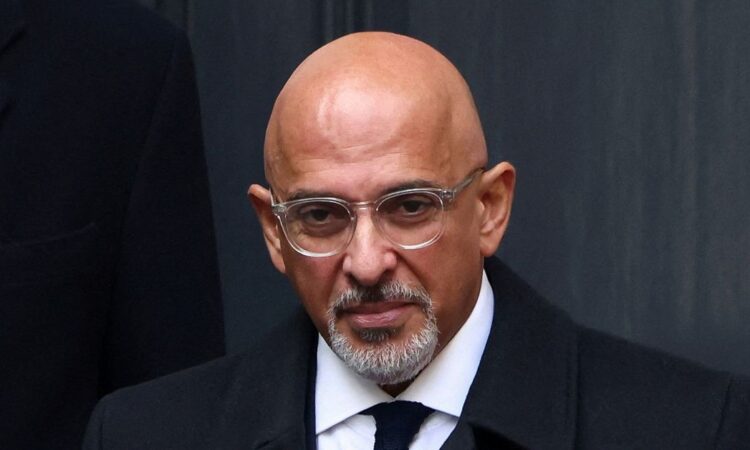
LONDON, Jan 29 (Reuters) – British Prime Minister Rishi Sunak sacked Conservative Party chair Nadhim Zahawi on Sunday after an investigation found he committed a serious breach by not being open about a tax probe, the latest scandal to hit one of Sunak’s top ministers.
Sunak had initially stood by Zahawi before ordering an independent adviser to investigate questions over his tax affairs after it emerged Zahawi had settled a probe by Britain’s tax authority HMRC last year.
Zahawi has said the tax body ruled he had been “careless” with his declarations but hadn’t deliberately made an error to pay less tax, confirming he paid a penalty to HMRC.
Sunak’s independent adviser Laurie Magnus said that Zahawi didn’t declare that his tax affairs were being investigated when he was briefly made finance minister last year, and failed to disclose details when Sunak appointed him to his current role.
“Following the completion of the Independent Adviser’s investigation … it is clear that there has been a serious breach of the Ministerial Code,” Sunak said in a letter to Zahawi.
“As a result, I have informed you of my decision to remove you from your position in His Majesty’s Government.”
Zahawi’s response to Sunak did not mention either the HMRC or independent adviser’s investigation. He expressed concern at the conduct of some in the media in recent weeks and said he would support Sunak’s agenda as a backbench lawmaker.
“I am sorry to my family for the toll this has taken on them,” he said.
It is a setback to Sunak’s attempt at a government reset after a chaotic year that saw three different British prime ministers. An investigation into alleged bullying by Deputy Prime Minister Dominic Raab is ongoing and could cause further headaches.
One Conservative lawmaker said sacking Zahawi was “clearly the right decision,” adding Zahawi “should have resigned to avoid the embarrassment.”
“Raab is rather different,” the lawmaker, who declined to be named, said. “One man’s bullying is another’s firm direction.” Raab has denied bullying allegations.
The opposition Labour Party said that Sunak had shown weakness in how he had handled the Zahawi and Raab cases.
“It’s vital that we now get answers to what Rishi Sunak knew and when did he know it,” Labour’s education spokesperson Bridget Phillipson said on Sunday.
Zahawi’s sacking comes as Sunak’s government, facing decades-high inflation and a wave of public sector strikes, trails badly in opinion polls ahead of an expected 2024 election.
UNTRUE PUBLIC STATEMENT
Magnus said that the details of HMRC’s own investigation – relating to Zahawi’s co-founding in 2000 of opinion polling firm YouGov, and how many shares his father had taken to support its launch – was outside the scope of his own inquiry.
But he found that Zahawi had failed to declare HMRC’s probing of affairs, or acknowledge that they were a serious matter. Zahawi had characterised reports last July over his tax affairs as “clearly smears”.
Zahawi did not correct the record until last week, when he said he had reached a settlement with the authorities.
“I consider that this delay in correcting an untrue public statement is inconsistent with the requirement for openness,” Magnus said in a letter to Sunak.
He added that Zahawi had shown “insufficient regard” for the requirement “to be honest, open and an exemplary leader through his own behaviour.”
Zahawi became finance minister following Sunak’s own resignation from the role in July last year, which helped end Boris Johnson’s scandal-hit premiership.
When he replaced Liz Truss as prime minister after her brief but tumultuous time in power, Sunak promised that “this government will have integrity, professionalism and accountability at every level.”
But the reboot has got off to a tricky start. Along with the investigations into Zahawi and Raab, Sunak reappointed interior minister Suella Braverman just five days after Truss sacked her for breaching the ministerial code around security rules, while in November minister Gavin Williamson resigned over bullying allegations.
Asked if Conservative politicians consistently follow their own set of rules, senior minister Michael Gove said there were “always people who will fall short.”
“Because someone commits a lapse or a sin, that shouldn’t be automatically taken as an opportunity to damn an entire organisation,” he told the BBC.
Reporting by Alistair Smout; Additional reporting by Elizabeth Piper
Editing by Alison Williams and Toby Chopra
Our Standards: The Thomson Reuters Trust Principles.






